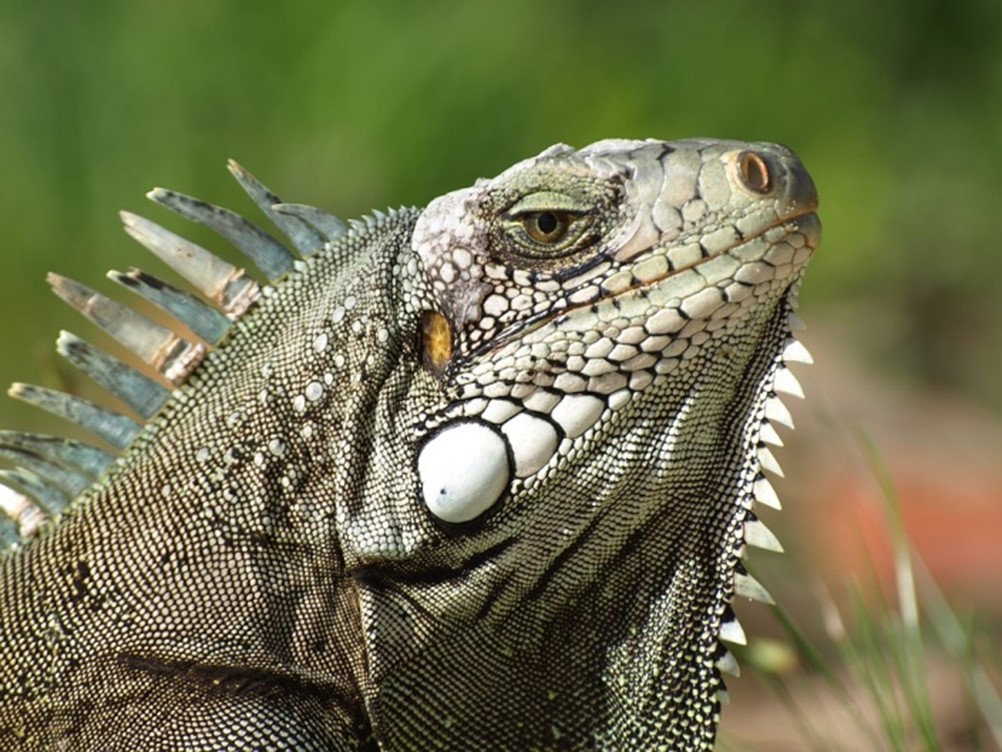CHAPTERS
Navigate to chapter
► Chapter One: Biological Information
► Chapter Two: Iguanas as Pets
► Chapter Three: How to Acquire Iguanas
► Chapter Four: Habitat Needs of Your Iguanas
► Chapter Five: The Right Diet for Your Iguana
► Chapter Six: Body Language of Iguanas
► Chapter Seven: Grooming and Maintenance Guidelines
► Chapter Eight: Sexing Your Iguanas
► Chapter Nine: Health Issues of Iguanas
► Chapter Ten: Care Sheet and Summary
Chapter Two: Iguanas as Pets

After gaining knowledge on all the basic information about iguanas, we hope that you’re now gaining insight about this exotic pet but it doesn’t stop there. It is only just the beginning! Before you make a decision if an iguana is the ideal pet for you, there are still many things for you to discover. With the aid of this chapter, you will be able to delve more vital information you need to know in order to make sure that this pet is the right kind for you and your family. We’ll discuss its behavior, legal requirements in order to keep one, as well as an overview of the cost it entails.
Behavioral Characteristics and Interaction
Just like human beings, an iguana is uniquely different from other species of its own kind. Some iguanas may act a little scared or aggressive but in general, they are a calm type. As long as they stay happy and feel safe, they will be able to develop more positive traits and become a rewarding exotic pet.
If you purchased a juvenile iguana, as it grows old, it will develop through stages of changes and will go in the direction of its inherent or natural characteristics. Some may have temperamental changes that are only temporary and can be reversed back to normal. The season and other environmental factors can trigger the change in behavior of iguanas.
Having a pet is like a gamble, you’ll be wishing that it’ll turn out to be a great pet without a hundred percent assurance. But if you are knowledgeable enough, you’ll be able to shape or hone the characteristics of your pet and make it as pleasant as possible. The way you raise your iguana is where there hope of becoming properly tamed relies on.
Expect that during the first days, the iguana will look afraid as there is a tendency that it will feel intimidated by its owner’s size. Do not get frustrated if this happens since it is just natural. Wait until your pet has fully adjusted. Have yourself familiarized by visiting your pet’s enclosure every day. If properly socialized, they can get along well with other animals as well as other people besides its owner.
Iguanas can be territorial especially the male ones. They may display head bobbing, hissing, and tail twitching as signs that they are being defensive. They may try to compress their body laterally in order for to look taller and intimidating.
Iguanas, if socialized properly, can be introduced to a variety of other pets. If you’re going to introduce a smaller pet like bird, beware of potential aggression that your iguana might display as they are really against “small intruders.” Each introduction will be different as pet varies from each other. Sometimes it goes smoothly and sometimes not. Make sure that you are supervising your pet when your iguana socializes with others to prevent any trouble. Always allow escape routes so that if ever one of them feels the need to retreat from the other, it can easily go.
Before anything else, you must first know the specie you are interested in. You should gather all the information you need in order to be well educated with regard to the pet you want to have. You should be able to answer generic questions like how much will it cost, how big will it get, what kind of food does it eat, what kind of care does it require, etc. So that if ever your family ask about these questions, you’ll be knowledgeable enough to answer it with confidence. Giving them the right answers can help them see how eager and willing you are to own an iguana.
Everything takes time and you shouldn’t rush things. Do not immediately drop the news that you want an iguana as a pet especially if the members of your family are uptight with this idea. Instead, you can give them hints that you are being fond of snakes lately. You can tell them stories about the iguana owners you know and their experiences in taking care of an iguana. By this way, they’ll know that it isn’t really that hard to maintain an iguana and they might even be an ideal pet for the family.
It is very unlikely that your family members or roommates will accept the idea overnight. If ever they still stand against it do not be angry or feel frustrated. It might take weeks, months, or even years. Just be patient encouraging them in the best possible way you can. Just be calm and do your best in persuading them. You’ll surely win their favor when you talk it to them constantly.
No matter how much you like having an iguana as your pet you must still consider your housemates’ decision. If they do not really approve, wait until they do so. You must respect their feelings towards it as it is not only you who’s going to deal with the snake but they will too. In that case, it is better for you not to buy at all. If you disregard their opinion about it, it may just cause you a problem. It might be the root of misunderstanding. You may be forced to re-locate your pet or bring it shelters and have it for adoption.
If ever your roommate or family saw how willing and able you are to take care of an iguana, this can be a great factor in order to make them say yes with it. Show them that you will be able to commit yourself with your potential pet and that you will be responsible enough to provide it with their needs.
Pros
- Its food is easy to find as an iguana has a herbivore diet which means they feed on plants, vegetables, and fruits alone.
- This specie can get along well with other animals.
Continue Reading…
Want to read the entire thing?

